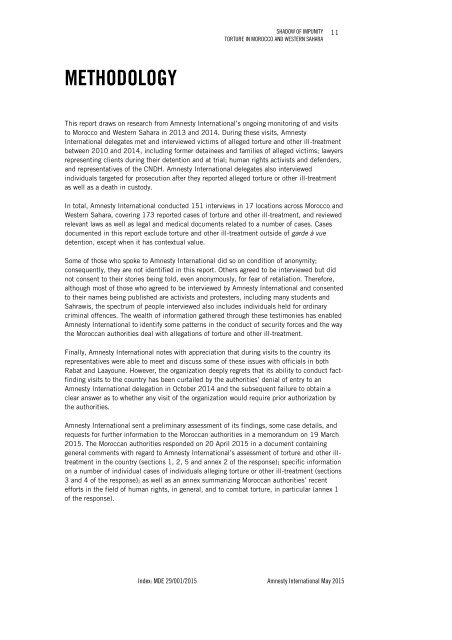7f2vH5qFw
7f2vH5qFw
7f2vH5qFw
You also want an ePaper? Increase the reach of your titles
YUMPU automatically turns print PDFs into web optimized ePapers that Google loves.
SHADOW OF IMPUNITYTORTURE IN MOROCCO AND WESTERN SAHARA11METHODOLOGYThis report draws on research from Amnesty International’s ongoing monitoring of and visitsto Morocco and Western Sahara in 2013 and 2014. During these visits, AmnestyInternational delegates met and interviewed victims of alleged torture and other ill-treatmentbetween 2010 and 2014, including former detainees and families of alleged victims; lawyersrepresenting clients during their detention and at trial; human rights activists and defenders,and representatives of the CNDH. Amnesty International delegates also interviewedindividuals targeted for prosecution after they reported alleged torture or other ill-treatmentas well as a death in custody.In total, Amnesty International conducted 151 interviews in 17 locations across Morocco andWestern Sahara, covering 173 reported cases of torture and other ill-treatment, and reviewedrelevant laws as well as legal and medical documents related to a number of cases. Casesdocumented in this report exclude torture and other ill-treatment outside of garde à vuedetention, except when it has contextual value.Some of those who spoke to Amnesty International did so on condition of anonymity;consequently, they are not identified in this report. Others agreed to be interviewed but didnot consent to their stories being told, even anonymously, for fear of retaliation. Therefore,although most of those who agreed to be interviewed by Amnesty International and consentedto their names being published are activists and protesters, including many students andSahrawis, the spectrum of people interviewed also includes individuals held for ordinarycriminal offences. The wealth of information gathered through these testimonies has enabledAmnesty International to identify some patterns in the conduct of security forces and the waythe Moroccan authorities deal with allegations of torture and other ill-treatment.Finally, Amnesty International notes with appreciation that during visits to the country itsrepresentatives were able to meet and discuss some of these issues with officials in bothRabat and Laayoune. However, the organization deeply regrets that its ability to conduct factfindingvisits to the country has been curtailed by the authorities’ denial of entry to anAmnesty International delegation in October 2014 and the subsequent failure to obtain aclear answer as to whether any visit of the organization would require prior authorization bythe authorities.Amnesty International sent a preliminary assessment of its findings, some case details, andrequests for further information to the Moroccan authorities in a memorandum on 19 March2015. The Moroccan authorities responded on 20 April 2015 in a document containinggeneral comments with regard to Amnesty International’s assessment of torture and other illtreatmentin the country (sections 1, 2, 5 and annex 2 of the response); specific informationon a number of individual cases of individuals alleging torture or other ill-treatment (sections3 and 4 of the response); as well as an annex summarizing Moroccan authorities’ recentefforts in the field of human rights, in general, and to combat torture, in particular (annex 1of the response).Index: MDE 29/001/2015 Amnesty International May 2015


